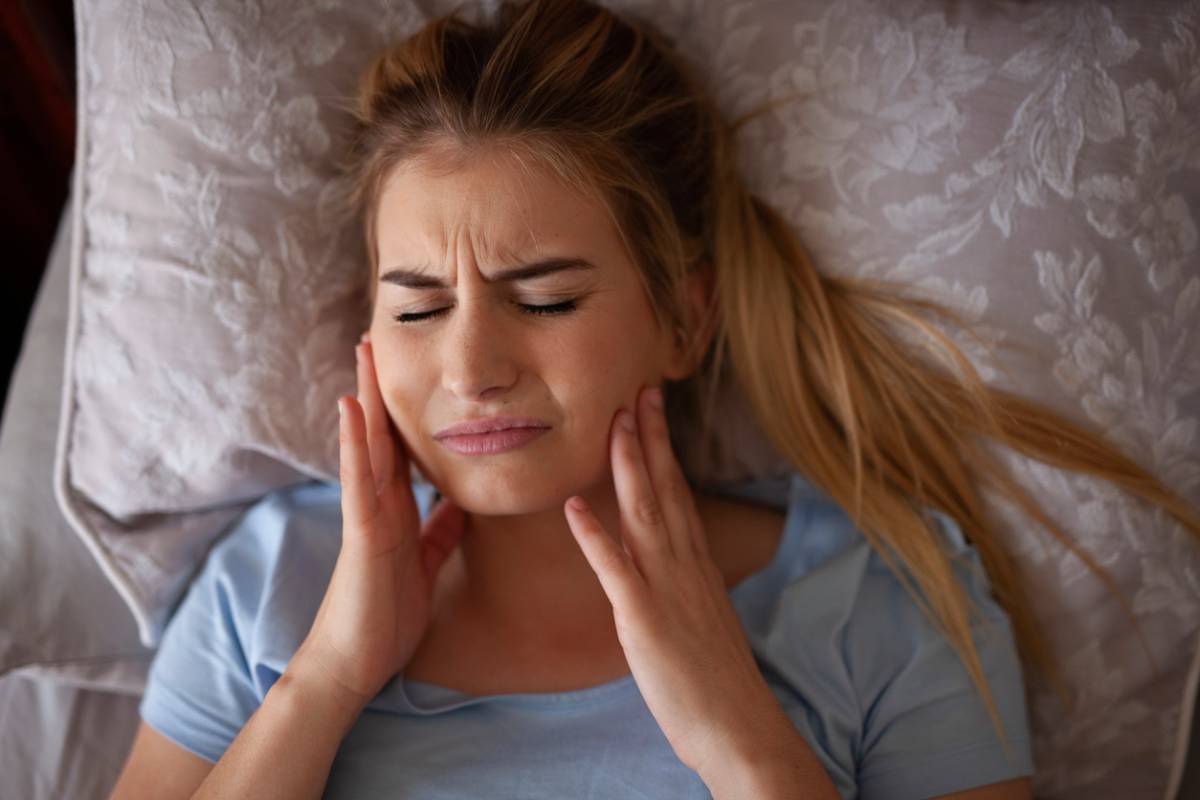Involuntary teeth grinding is a common issue that can lead to teeth wearing out faster and to tension and pain in the jaw and facial and neck muscles. But how can you know if you grind your teeth at night? In this article, we talk about the signs of teeth grinding and treatment methods.
How Can You Know If You Grind Your Teeth At Night
Involuntary teeth grinding or clenching can also be called bruxism. In most cases, bruxism is more severe at night when you sleep and can not be consciously aware of the issue. However, some people can also involuntarily grind or clench their teeth during the day without noticing it.
The best way to determine if you have bruxism is to consult with your dentist. However, the symptoms we list below might mean that you grind your teeth at night or during the day:
Jaw Pain, Tension, or Soreness
One of the most common symptoms of bruxism is tension, pain, or soreness in the jaw, especially in the morning. These feelings are caused by excess pressure applied to the jaw muscles and joints by chronic teeth grinding and clenching.
Neck and Back Pain and Headaches
Jaw muscle hypertension can also spread to the connected muscles of the neck and back, leading to pain. Additionally, frequent morning headaches, especially those that start in the temples, are a frequent sign of hypertension caused by bruxism.
Waking up During the Night
Sometimes, teeth grinding or clenching can wake you up one or several times during the night. If you experience disturbed sleep, check for other signs of bruxism and consult your dentist.
Worn off Tooth Enamel and Increased Tooth Sensitivity
Constant friction wears off teeth’s enamel faster, increasing sensitivity to cold and hot foods and beverages. Teeth with worn-off enamel can also appear stained or discolored.
Tooth Damage
Bruxism can cause teeth to become visibly flatter. In some cases, grinding can even result in teeth cracking or chipping.
Damage of Soft Tissue in the Mouth
When you grind or clench your teeth, you can also accidentally bite the soft tissue of the chicks or the tongue. Thus, sores or lacerations in the mouth can mean that you have bruxism.
Changes in the Appearance of Jaw Muscles
Chronic teeth grinding and jaw clenching can change the way your jaw muscles appear, particularly if they look enlarged.
Causes and Risk Factors of Bruxism
Teeth grinding can be caused or exacerbated by the following factors:
- Stress and anxiety, especially if these conditions are chronic
- Various sleep disorders, such as sleep apnea, restless leg syndrome, etc.
- Some medications, such as antidepressants
- Intake of alcohol, caffeine, or recreational drugs
Bruxism Treatment Methods
A variety of treatment methods are available for people with bruxism.
A Custom-made Mouth Guard
Wearing a mouth guard at night fixes the jaw in one position and prevents it from moving. Wearing a mouth guard when dealing with bruxism also helps prevent further teeth damage caused by friction.
A custom-made mouthguard, which you can get at your dental office, is typically the most comfortable and effective option, as it is fitted perfectly to the shape of your mouth and teeth. However, there are also over-the-counter mouth guards that can help reduce the effects of bruxism.
Behavioral and Psychological Strategies
Counseling, Cognitive Behavioral Therapy, meditation practices, and relaxing sports activities such as yoga and stretching can help reduce anxiety and stress, leading to more restful sleep, muscle relaxation, and a reduction of involuntary teeth clenching and grinding.
Medications
Some patients might benefit from muscle relaxants or anti-anxiety medications. Sometimes, botulinum toxin injections can be used to control the chewing muscles, thus reducing the severity of bruxism.
Lifestyle Changes
Since bruxism is often closely tied to stress, anxiety, and overstimulation, reducing the intake of caffeine, alcohol, and recreational drugs can significantly improve the quality of sleep and reduce teeth grinding as a result.
Improving your sleep hygiene by excluding stimulation for a couple of hours before bed, going to sleep at the same time every day, and investing in a comfortable orthopedic pillow can also help combat bruxism.
Teeth Grinding Treatment at The Smile Artist LA
Consult an experienced dentist at the Smile Artist LA dental office if you suspect that you involuntary grind or clench your teeth. We will carefully examine your teeth to determine if the condition is present and offer you a comprehensive solution. We are looking forward to your visit.





 )